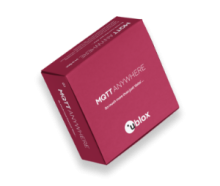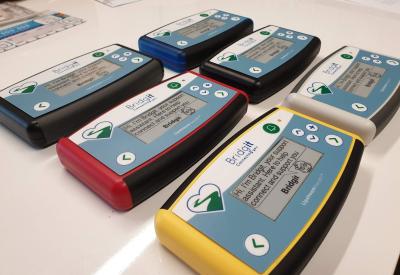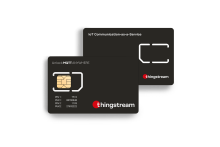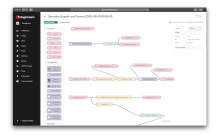
Case studies
英国 NHS 将通过 Upstream Health“Home Support Hub”节省大量资金
u-blox 物联网“通信即服务”解决方案可为“不精通技术”的一代提供简单可靠的通信方式。

Upstream Health, a UK-based health tech company, is all about prevention. It is building technologies that look into the future for its clients, identifying the actions needed today that will help them stay well tomorrow.
There are approximately 2 million elderly people who currently receive social care in their homes in the UK. The drain on NHS resources when medical conditions become critical is substantial and social care services are already stretched, and with the COVID-19 pandemic, it’s even harder with an increase in isolation and loneliness due to shielding. New ways to communicate, support, and assist this key group are needed now more than ever.
The Upstream Health team wanted to provide an easy to install and low-cost monitoring solution to provide a non-intrusive way to learn and build ‘need’ insights about the patients and their homes.
The Bridgit Home Support Hub is a real-time medical and behavioral home monitor that measures more than 40 data points, relaying the data back to the family or carer via an online app. This IoT data solution provides elderly client data and insight so that care can be planned, preventative remedies can be put in place, and crucially, patients can live longer and independently in their own homes.
Already deployed into Hull City Council in the UK and with pilots starting in York and North Wales, Upstream health has created an IoT application that is cost-effective, simple to deploy, and most importantly simple to use.
The Challenge - Introducing technology to the ‘non-tech-savvy’ generation
The potential market is huge. In the UK alone there are an estimated 2 million people (and 250 million globally) who require home support. However, in some regions of the UK, over 50% of the elderly community don’t even have an internet connection.
Once the capabilities of the IoT device were established, the key challenge was getting the data collected and made available on the platform provided by Upstream Health.
A Wi-Fi-connected solution has too many potential complications to be considered for an IoT solution requiring a reliable connection or quick, simple deployment and can be problematic to set up and maintain for the elderly or infirm.
The team at Upstream Health also looked into the many initiatives being rolled out for LoRaWAN® across UK cities. However, the team quickly realized that the upload and download transmission intervals wouldn’t be suitable, and the patchy coverage would limit their ability to deploy at scale.
The Solution - The connectivity layer is the core of the solution
If the device can simply be taken out of a box, switched on, and it connects; if it can work automatically to remotely collect and securely transmit numerous data points, then the benefits are clear.
To achieve this, Upstream Health turned its attention to GSM-based IoT solutions and partnered with u-blox to provide this via its IoT Communication-as-a-Service platform, Thingstream.
The GSM-based MQTT Anywhere IoT communication service was the perfect solution.
MQTT Anywhere offers:
- Access 600+ GSM carriers across 190 countries allowing for global rollout of IoT devices
- Fixed, low-cost, connectivity creating simple predictable pricing
- Enhanced data protection by way of having no exposed IP address
- Bi-directional messaging allows carers to push information to the device
- Industry-standard MQTT-SN communication
- Carrier-grade MQTT Broker
Once the battery-powered Bridgit IoT device is attached to the patient’s fridge, it can take over 40 different data measurements and send the patient reminders. Information is shared with the patient’s family via an app. Using care intelligence, carers can be alerted if abnormal activity is detected.
Outcomes
Upstream Health now has a simple, ready to use device which is secure and provides clear behavioral information but importantly offers predictability on costing. Bi-directional message flow gives valuable insight into patient welfare and remote care possibilities that aren’t currently available from any other solution:
- Ease of deployment - Bridgit Home Hub works straight out-of-the-box with no setup barriers
- Low-power - The u-blox IoT Communication-as-a-Service solution supports situations where maximizing battery life is a major consideration
- Fixed-cost pricing - Upstream Health has clear visibility and no data cost surprises
- Global - The solution will work in over 190 countries without reconfiguration
- Empowering - Data can be used to predict patient issues before they become serious, keeping patients in the homes and independent longer
- Push patient check-ins - Regular contact to the support hub from the carer can check on the well-being of patients to ensure everything is ok
The longer people can remain healthier and happier in their own homes the less strain there is on hospital infrastructure. If you can streamline care in the community through big data the benefits are enormous.
The UK’s NHS (National Health Service) and PSS (Prescribed Patient Services) analysis of the Upstream Health solution suggests wide deployment of the Bridgit Home Support Hub could result in a net cost saving per patient of £10,382 over five years. That equates to potential savings for the UK NHS, of around 4 billion per year.
特色产品

